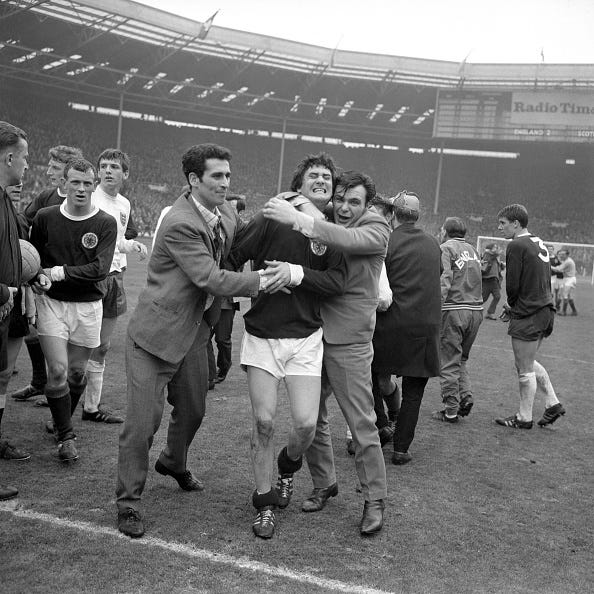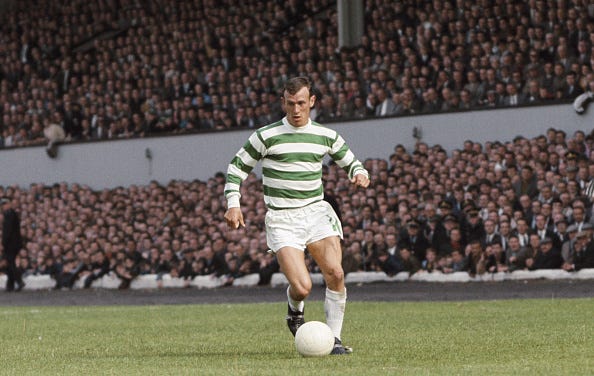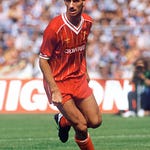In My Sporting Hero, a new podcast series from Nutmeg, footballers talk about the athletes who inspire them. Sometimes those sportsmen and women are also footballers. Sometimes not. You can listen to the audio on this post, on the podcast app of your choice (just search for ‘My Sporting Hero’) or enjoy the written version below.
This week’s guest is Billy Stark. Billy began his career with the estimable St Mirren sides of the late 1970s and early 1980s, before being signed by Sir Alex Ferguson for his all-conquering Aberdeen where he won the double in 1984. Celtic came calling, and another double followed with the club’s beloved centenary team. Coaching and managerial highlights include leading the Scotland under-21s and assisting the late, great Tommy Burns at Kilmarnock and Celtic. Reflecting a background which had split Glasgow loyalties, Billy chooses not one, but two sporting heroes: Rangers legend Jim Baxter and Celtic superstar Bobby Lennox.
Slim Jim Baxter
My mum was Catholic and my dad Protestant, so he favoured Rangers and took me along to Ibrox where I first saw Jim Baxter. As you would imagine, in terms of the West of Scotland bigotry, there was none of that in our family. Maybe my dad was initially a wee bit reticent about the bigotry element as the first ground he took me to was Firhill. I remember it because it was the big, bold red-and-yellow hoops for Partick Thistle and the blue-and-white thick stripes for Kilmarnock – a blaze of colour. Don’t ask me the score. It’s just the actual event and the colourful scene that really stuck in my memory.
As for my mum’s side of the family, her brother stayed in Govan. His son Jim now stays across the road from Hampden and is always on to me for tickets for Celtic games. We used to go over to Govan to visit them and Jim had every Celtic programme. He went to every game and kept all the programmes. So, I’ve got a vivid memory of going through these Celtic programmes. I probably had more of a knowledge of the Celtic side than Rangers, just from those programmes. I don’t think anybody in their right mind would say they supported one side of the Old Firm and had a soft spot for the other, but I formed an interest in Celtic early on.
Baxter was a star. It was a good Rangers side in the early 60s that won many trophies, but Baxter was the standout performer. I can remember my dad taking me to my first Scotland game, Scotland-Italy in ’65, a World Cup qualifier. John Greig scored the goal and Baxter slipped the pass through to him.
He was a massive star in Scottish terms. He was never a tackler or an aggressive player, and I wouldn’t have put myself in that category either, the way I developed. He was slim in those days, which is the sort of profile I had as well, but I was certainly not the type of player Jim Baxter was. It was still the old 2-3-5. Baxter was an inside-forward, and they were the real creators in the team, everything went through them. They fed the wingers, the wingers crossed the ball and the striker – the centre-forward – attacked the penalty box along with the inside-forwards.
So, Baxter was developing into what they would call a controller nowadays. He would be quite at home the way the game’s played today, in terms of receiving the ball, shimmying, dropping the shoulder, beating players with ease, and then having that silky pass you see nowadays on modern pitches, which he certainly didn’t have the luxury of playing on. The old pitches made weighting a pass a bit more difficult, but he had that art. He was an ebullient character who loved the limelight. Those type of guys use every platform, particularly the biggest stages, to show their talents.

Bobby the Buzzbomb
I worked with Bobby when I moved to Celtic as a player and he was on the coaching staff. He is one of the greatest guys I’ve ever met in football . He had a great personality and loved a laugh. He was so humble. Speaking to one or two people that were coaching around the time that Bobby was starting out, they remember him as a struggling outside-left for Celtic. Jock Stein – as he did with a number of players – converted Bobby Murdoch from an inside-forward to a wing-half and Bobby Lennox to a striker. Reading all those programmes and listening to radio games, ‘…and it’s Lennox through on the goalkeeper, one-on-one,’ and he never blasted it, he always just toe-poked it by the goalkeeper.
I don’t know if it was the name that first caught me as well: Lennox, the way the commentator would say it. Then you saw him in the flesh, and that speed and composure in terms of finishing, but intelligence as well. He was definitely my Celtic man. There’s no doubt Bobby’s scoring record with Celtic stands for itself, but if VAR had been in operation in those days, I think he would have doubled his tally; he was so quick that he beat the linesman in terms of flagging him offside. So that speed was the first thing that catches your eye. But so many of those types of players over the years didn’t have the finishing. Bobby must have been a nightmare to play against for defenders because he maximised that space in behind to the full.
I think Bobby enticed goalkeepers because they thought they could get there, and they didn’t realise how quick he was. So, there was a point where the ball was just out of reach, and he would just stretch for it and poke it by the goalkeeper. That composure in finishing is the key to identifying the real goal-scorers. If you’ve played at any sort of level, you can actually see it in the best strikers – they’re not quite panicking, but they’re not in full control of themselves either. That’s where the real finishers have their ability. Ice cool. Sometimes I hear commentators saying that they didn’t strike it sweetly enough, yet they got the goal; they don’t understand that if you’re concentrating on trying to get the sweet part of your foot to finish, you’ll miss more than you’ll score. It’s about timing, that wee split-second where you don’t need to get the best part of your foot on the ball, but you get accuracy … and you score.

I’ve been lucky enough to have had a reasonable career at the top level in Scotland with Aberdeen and Celtic. I played in some great St Mirren teams. We won the Anglo-Scottish Cup and got promoted from the First Division. In February 1980, we got drawn against Celtic in the fourth round at Parkhead. We had a confidence about us. That night Frank McDougall scored for us. We thought we were getting through when wee Murdo MacLeod scored late on in the game to force a replay. The replay was the most notable game because it was played at Love Street on a Wednesday night. The crowd was absolutely incredible. Jam-packed Love Street and a ding-dong battle. Celtic eventually won 3-2 after extra-time. And of course, as usual, Lennox was on the scoresheet. He was well into his mid-30s by then, so it just shows what you can do if you’re a good professional, and you have the ability that Bobby had. You have to tailor your game when you get into your 30s, particularly the quick players, but he had craft as well. It was a big thing to have a Lisbon Lion still playing at that stage. And especially one that was as good a professional and as good a guy as Bobby. He would have been helping the youngsters breaking through, like Tommy Burns. There were so many aspects of Bobby playing that kept Celtic a successful side.












Share this post